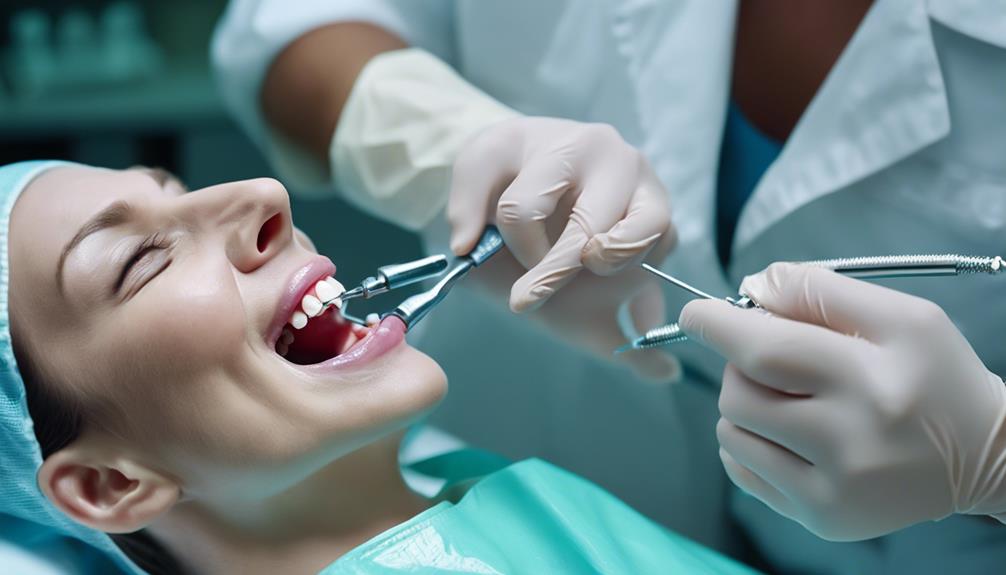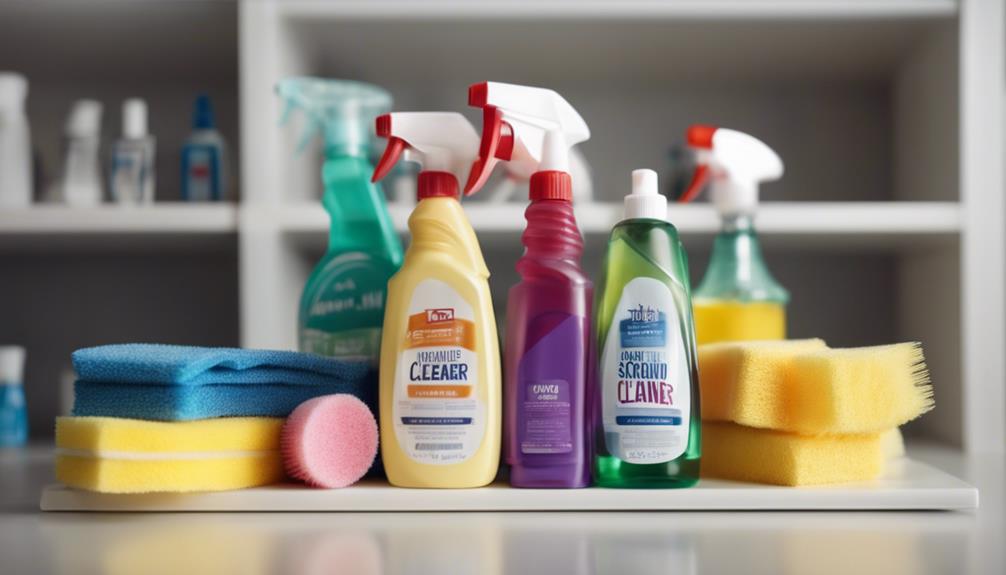Deep cleaning is essential for your oral health as it targets harmful plaque and tartar, preventing gum disease like gingivitis. It removes bacteria and tartar, allowing gums to heal and attach to teeth properly. This procedure enhances gum health, combats bad breath, and boosts your confidence. By prioritizing deep cleaning, you safeguard your smile from further damage and maintain good oral hygiene.
Key Takeaways
- Prevents gum disease progression by removing harmful bacteria.
- Addresses deep-seated plaque and tartar for gum health.
- Reduces risk of tooth loss and complications.
- Improves breath freshness and overall oral hygiene.
- Vital for preventing infections and maintaining oral health.
Understanding Deep Cleaning Importance
To truly grasp the significance of deep cleaning for your oral health, understanding its role in preventing gum disease is vital. Deep cleaning plays an important role in combating gum disease by targeting the root cause: plaque and tartar buildup.
These stubborn deposits harbor harmful bacteria that can irritate and inflame your gums, leading to gingivitis and, if left untreated, progressing to more severe forms of gum disease. Through deep cleaning, these bacteria and tartar are meticulously removed from below the gumline, allowing your gums to heal and reattach to the roots of your teeth. By eliminating the source of infection, deep cleaning not only improves your gum health but also prevents further damage to the roots and jawbones.
Additionally, deep cleaning can effectively combat bad breath caused by the presence of plaque and bacteria, enhancing not only your oral health but also your overall confidence.
Key Differences From Routine Cleaning

You may wonder how deep cleaning differs from routine cleaning.
Deep cleaning targets bacterial buildup in diseased gum tissue, while routine cleaning focuses on removing buildup from healthy gums.
Unlike routine cleaning, deep cleaning requires local anesthetic and is typically done in two appointments to guarantee thorough treatment.
Deep Cleaning Importance
Deep cleaning plays a crucial role in oral health by addressing bacterial deposits beneath the gums, distinguishing it from routine cleanings.
Specifically designed for individuals with gum disease, deep cleaning targets bacterial buildup that has accumulated below the gum line. This procedure is important in treating gum disease by removing these deposits and preventing further progression of the condition.
Unlike routine cleanings, deep cleanings involve a more thorough process that includes two appointments, the application of local anesthetic, and the thorough removal of bacteria from diseased gum tissue.
Routine Cleaning Contrasts
In contrast to deep cleanings, routine cleanings primarily focus on maintaining the cleanliness of healthy gum tissue. Unlike deep cleanings, routine cleanings are typically completed in a single appointment and don't usually require the use of local anesthetic for comfort.
While deep cleanings target bacterial buildup from diseased gum tissue and may involve two appointments for thorough treatment, routine cleanings aim to prevent excessive bacterial accumulation on healthy gums.
It is important to note that the decision between a deep cleaning and a routine cleaning is based on individual patient needs. Routine cleanings are essential for maintaining oral health but may not be sufficient for individuals with gum disease. Neglecting the need for a deep cleaning when recommended can leave harmful bacteria on the teeth, increasing the risk of further oral health complications.
Dentists tailor treatment plans to address specific oral health concerns, emphasizing the importance of personalized dental care for best results.
Need for Deep Cleaning Vs. Routine Cleaning

Routine cleanings focus on preventive care, while deep cleanings are essential for removing bacterial deposits that cause gum disease. Periodontal disease, often caused by untreated bacterial buildup, can lead to serious oral health issues if not addressed promptly. Deep cleaning, also known as scaling and root planing, targets areas under the gums where routine cleanings can't reach.
Unlike routine cleanings that aim to maintain healthy gums, deep cleanings are vital for patients with gum disease to prevent further deterioration.
Failure to undergo a deep cleaning when recommended can result in persistent bacteria on the teeth, contributing to the progression of periodontal disease. Deep cleanings typically require two appointments and may involve the use of local anesthesia for patient comfort. In contrast, routine cleanings are usually completed in a single visit without the need for anesthesia.
Dentists tailor treatment plans to each patient's specific needs, ensuring that deep cleanings are performed when necessary for best oral health outcomes.
Dental Cleanings and Personalized Care

Personalized care plans are vital for guaranteeing the best oral health outcomes during dental cleanings. These plans are customized to address individual needs and concerns, guaranteeing that each patient receives the most effective treatment.
When it comes to deep cleanings, personalized care is particularly pivotal. Deep cleanings are necessary for treating gum disease and preventing tooth loss. By creating personalized care plans, dental professionals can target specific areas of concern and provide the necessary treatments to restore oral health.
Follow-up cleanings play a significant role in monitoring oral health after a deep cleaning. These appointments allow dentists to assess the progress, make any adjustments to the care plan, and ensure that the desired outcomes are achieved.
Additionally, proper home oral care habits are vital for maintaining the results of a deep cleaning. By following recommended oral hygiene practices, you can prolong the benefits of a deep cleaning and promote long-term oral health.
Post-Deep Cleaning Home Habits

After undergoing a deep dental cleaning at the dentist's office, maintaining proper home habits is essential for preserving the benefits of the treatment and promoting long-term oral health.
To upkeep the cleanliness achieved during the deep cleaning, it's recommended to brush your teeth with an electric toothbrush after breakfast and before bed. This practice helps in ideal oral hygiene by effectively removing plaque and food particles.
Additionally, remember to floss every night before bed using the correct technique to further eliminate any remaining plaque between your teeth.
After brushing and flossing, make sure to utilize any prescribed mouthwash to sustain a healthy oral environment.
It's vital to follow up with your dentist for regular cleanings every three months to promote gum health and prevent plaque buildup.
Consistent home habits, including regular brushing, flossing, and dental visits, are necessary for sustaining the benefits of a deep cleaning and overall oral health.
Benefits and Risks of Deep Cleaning

Discover the advantages and potential drawbacks of deep cleaning for your oral health. Uncover how deep cleaning can protect your teeth and gums from decay while also learning about the risks, such as tooth sensitivity and gum recession.
Understanding both sides can help you make informed decisions about your dental care routine.
Benefits of Deep Cleaning
Removing plaque and tartar buildup through deep cleaning offers numerous benefits and some potential risks for your oral health. Here are the benefits of deep dental cleanings:
- Prevents Gum Disease and Tooth Loss: Deep cleaning helps in removing the bacteria that cause gum disease, ultimately reducing the risk of tooth loss.
- Freshens Breath: By eliminating plaque and tartar, deep cleaning contributes to fresher breath and improved overall oral hygiene.
- Improves Oral Health: Regular deep cleanings can notably decrease the chances of developing dental issues, maintaining healthy teeth and gums.
- Reduces Dental Problems: Deep cleaning aids in reducing the risk of cavities, infections, and other oral health complications, promoting a healthier mouth.
Risks of Deep Cleaning
Thorough cleaning for your teeth and gums carries various benefits, but it also poses potential risks that you should be aware of.
While thorough cleaning is important for preventing gum disease progression and improving oral health, it can lead to tooth sensitivity and gum recession in some cases. Tooth sensitivity may occur after thorough cleaning due to the removal of plaque and tartar, exposing the teeth to external stimuli.
Additionally, gum recession, where the gum tissue pulls back from the teeth, is a risk associated with aggressive thorough cleaning techniques. Furthermore, there's a possibility of unintentional damage to the tooth enamel during the cleaning process.
Despite these risks, thorough cleaning remains an essential procedure for effectively treating gum disease and maintaining good oral hygiene. It's crucial to discuss any concerns about potential risks with your dentist to guarantee a safe and beneficial thorough cleaning experience.
Frequently Asked Questions
How Important Is a Dental Deep Cleaning?
A dental deep cleaning is essential for your oral health. It helps halt gum disease, removes plaque, prevents infections, and freshens breath. By maintaining healthy gums, you protect your roots and jawbones, ensuring overall oral health.
Why Is Dental Cleaning Important?
Regular dental cleaning is essential for oral health because it removes plaque and tartar buildup, preventing gum disease, decay, and bad breath. Professional cleanings reach areas missed by regular care. You'll keep your smile bright and healthy!
Does Deep Cleaning Help With Bad Breath?
Yes, deep cleaning helps with bad breath by removing bacteria and plaque buildup that cause halitosis. It targets bacteria in pockets around teeth and gums, promoting fresher breath and better oral health. Regular deep cleanings combat bad breath effectively.
How Long Does It Take for Gums to Heal After Deep Cleaning?
Your gums are like a garden after a deep cleaning; they need time to heal and flourish. Typically, it takes 1 to 2 weeks for gums to heal post deep cleaning. Proper care and follow-up visits aid in the process.
Conclusion
To sum up, while regular cleanings are crucial for maintaining oral health, dental deep cleanings elevate the process by focusing on areas that routine cleanings may overlook.
By integrating both types of cleanings into your oral care regimen, you can guarantee a comprehensive and customized approach to preserving the health of your teeth and gums.
So don't merely opt for the fundamentals – delve deeper for a genuinely clean and healthy smile!










